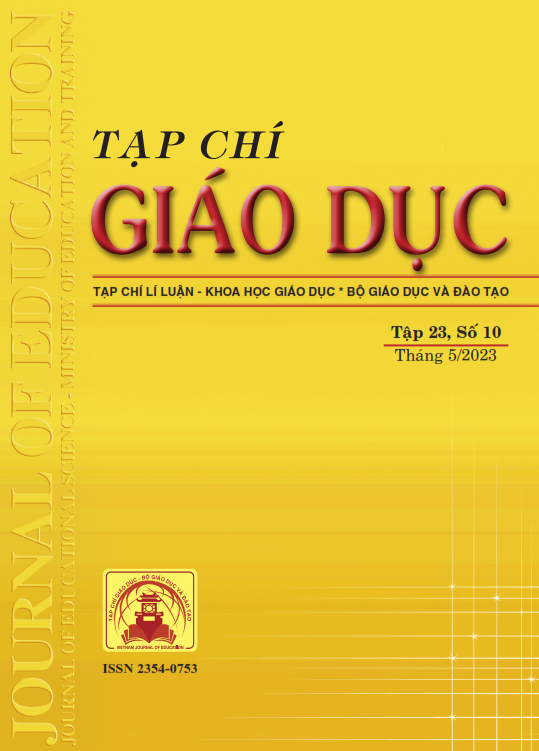Lí thuyết tự quyết (SDT): quan niệm, phân loại và ý nghĩa đối với vấn đề tạo động lực học tập cho sinh viên Việt Nam
Tóm tắt
Enhancing the participation of internal and external factors is an indispensable part to promote learning motivation and effectiveness for students. The study aims to provide a systematic view of the concept, structure, and core components of learning motivation according to the self-determination theory and its implications for creating learning motivation for learners. The research results showed that over many decades of research, although each study has a different interpretation or level of understanding, there is a general consensus of opinion about the strong relationship between internal motivation and extrinsic motivation, in which intrinsic motivation plays a decisive role. The research results also acknowledged the three core elements of self-determination theory: autonomy, environmental control, and social interaction. This suggests some implications in education to create learning motivation for students in Vietnam when education transitions to a "new normal" based on the flexible application of the above elements.
Tài liệu tham khảo
Black, A. E., & Deci, E. L. (2000). The effects of instructors' autonomy support and students' autonomous motivation on learning organic chemistry: A self‐determination theory perspective. Science Education, 84(6), 740-756.
Bùi Thị Thúy Hằng (2011). Động cơ học tập theo lí thuyết tự quyết. Tạp chí Khoa học Giáo dục, 6, 44-46.
Chiu, T. K. (2022). Applying the self-determination theory (SDT) to explain student engagement in online learning during the COVID-19 pandemic. Journal of Research on Technology in Education, 54(sup1), S14-S30.
Chiu, T. K., Lin, T. J., & Lonka, K. (2021). Motivating online learning: The challenges of COVID-19 and beyond. The Asia-pacific Education Researcher, 30(3), 187-190.
Chu, A. M., Liu, C. K., So, M. K., & Lam, B. S. (2021). Factors for sustainable online learning in higher education during the COVID-19 pandemic. Sustainability, 13(9), 5038.
Deci, E. L., & Ryan, R. M. (1985). Intrinsic motivation and self-determination in human behavior. New York: Plenum.
Gustiani, S. (2020). Students’ motivation in online learning during Covid-19 pandemic era: A case study. Holistics Journal, 12(2), 23-40.
Hartnett, M., & Hartnett, M. (2016). The importance of motivation in online learning. Motivation in online education, 5-32.
Hira, A., & Anderson, E. (2021). Motivating online learning through project-based learning during the 2020 COVID-19 pandemic. IAFOR Journal of Education, 9(2), 93-110.
Meeter, M., Bele, T., Den Hartogh, C. F., Bakker, T., De Vries, R. E. & Plak, S. Vrije. (2020). College students’ motivation and study results after COVID-19 stay-at-home orders. PsyArXiv. https://doi.org/10.31234/osf.io/kn6v9
Nielsen, T. (2018). The intrinsic and extrinsic motivation subscales of the Motivated Strategies for Learning Questionnaire: A Rasch-based construct validity study. Cogent Education, 5(1), 1504485.
Nguyễn Hữu Tài, Lâm Thành Hiền, Nguyễn Thanh Lâm (2016). Các yếu tố tác động đến động lực học tập của sinh viên - Một ví dụ của Trường Đại học Lạc Hồng. Tạp chí Khoa học Lạc Hồng, Trường Đại học Lạc Hồng, 5, 1-6.
Nguyễn Thị Thanh Tùng (2022). Các yếu tố ảnh hưởng tới động lực học tập của người học trong bối cảnh đại dịch Covid-19: Một tiếp cận hệ thống lịch sử nghiên cứu. Tạp chí Khoa học, Trường Đại học Sư phạm Hà Nội, 4, 168-175.
Ryan, R. M. & Deci, E. L. (2000b). Intrinsic and Extrinsic Motivations: Classic Definitions and New Directions. Contemporary Educational Psychology, 25, 54-67. https://doi.org/10.1006/ceps.1999.1020
Ryan, R. M. & Deci, E. L. (2020). Intrinsic and extrinsic motivation from a self-determination theory perspective: Definitions, theory, practices, and future directions. Contemporary Educational Psychology, 61, 1-32.
Ryan, R. M., & Deci, E. L. (2000a). Self-determination theory and the facilitation of intrinsic motivation, social development, and well-being. American Psychologist, 55(1), 68-78.
Ryan, R. M., & Deci, E. L. (2017). Self-determination theory: Basic psychological needs in motivation, development, and wellness. New York, NY: Guilford Publishing.
Ryan, R. M., & Niemiec, C. P. (2009). Self-determination theory in schools of education: Can an empirically supported framework also be critical and liberating? Theory and Research in Education, 7(2), 263-272.
Ryan, R. M., & Stiller, J. (1991). The social contexts of internalization: Parent and teacher influences on autonomy, motivation and learning. In P. R. Pintrich & M. L. Maehr (Eds.). Advances in motivation and achievement, 7, 115-149.
Ryan, R. M., Stiller, J. D., & Lynch, J. H. (1994). Representations of relationships to teachers, parents, and friends as predictors of academic motivation and self-esteem. The Journal of Early Adolescence, 14(2), 226-249.
Tran, C., Chen, J., Warschauer, M., Conley, A., & Dede, C. (2012). Applying motivation theories to the design of educational technology. In Proceedings GLS 8.0: Games+ learning+ society conference (p. 291).
Whang, P. A., & Hancock, G. R. (1994). Motivation and mathematics achievement: Comparisons between Asian-American and non-Asian students. Contemporary Educational Psychology, 19(3), 302-322.
Tải xuống
Đã Xuất bản
Cách trích dẫn
Số
Chuyên mục
Giấy phép

Tác phẩm này được cấp phép theo Ghi nhận tác giả của Creative Commons Giấy phép quốc tế 4.0 .












